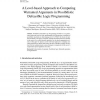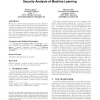35 search results - page 2 / 7 » A Formal Framework for Program Anomaly Detection |
COMMA
2008
13 years 6 months ago
2008
Abstract. Possibilistic Defeasible Logic Programming (P-DeLP) is an argumentation framework based on logic programming which incorporates a treatment of possibilistic uncertainty a...
CCS
2009
ACM
14 years 1 days ago
2009
ACM
We propose a framework for quantitative security analysis of machine learning methods. Key issus of this framework are a formal specification of the deployed learning model and a...
ISSTA
2010
ACM
13 years 9 months ago
2010
ACM
Real production code contains lots of knowledge—on the domain, on the architecture, and on the environment. How can we leverage this knowledge in new projects? Using a novel lig...
SP
1999
IEEE
13 years 9 months ago
1999
IEEE
There is often the need to update an installed Intrusion Detection System (IDS) due to new attack methods or upgraded computing environments. Since many current IDSs are construct...
WWIC
2010
Springer
13 years 9 months ago
2010
Springer
Abstract. This paper proposes new cognitive algorithms and mechanisms for detecting 0day attacks targeting the Internet and its communication performances and behavior. For this pu...


